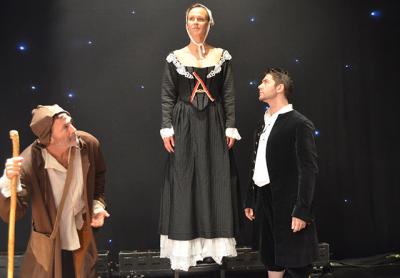Sin and Sanctimony at Bay Street

Who would have thought a stage version of a classic 19th-century novel by Nathaniel Hawthorne would also work as a commentary on our recent politics? Certainly not me, who took the opportunity to view “The Scarlet Letter” (running through Nov. 26 at Sag Harbor’s Bay Street Theater) as a respite from election exhaustion.
This new adaptation, however, was written specifically for this production by Scott Eck and the play’s director, Joe Minutillo, and while it loses no opportunity to allude to the rhetoric of our president-elect, it is careful not to overwhelm the spirit of Hawthorne’s masterwork.
Of course the material is rich for contemporary analogies, with its themes of sin, sanctimony, and forgiveness. “The Scarlet Letter,” many will remember, is set in the Massachusetts Bay Colony in the mid-1600s, where Hester Prynne has been accused of adultery and must wear a scarlet A stitched to the front of her dress. As the play begins, she is forced to stand in the stocks in the town square, where its residents heap scorn upon her. When she is asked to name her lover, she refuses.
Among the crowd is her former husband, who now calls himself Roger Chillingworth, and the town minister, Arthur Dimmesdale. Much of the plot is generated by Chillingworth’s pursuit of the identity of his wife’s paramour, and by the minister’s need to conceal the fact that it’s he who is Hester’s lover and the father of her daughter, Pearl.
Was it really adultery? When their affair began, Hester apparently believed her husband had been lost at sea. Not that it mattered either way to Hawthorne, whose real theme is not fidelity but the folly of sanctimony and the danger of casting aspersions.
Chillingworth, for example (played with measured agony by Nick Gregory), becomes physically misshapen in his pursuit of vengeance; and the mystery of Hester Prynne’s lover, which consumes the colony for seven years, has literally torn the town to shreds by the story’s end. The bitter irony is that simple forgiveness might have healed them all long ago.
Local audiences are by now familiar with the lead actress, Chloe Dirksen, who was brilliant in last year’s “This Wide Night” at Guild Hall, and who acquits herself well here as Hester, portraying her with a gentle but defiant dignity. Also notable is Kathleen Mary Carthy as Mistress Hibbins, the governor’s eccentric sister, who injects much-needed energy and humor into the play with her Gothic, operatic style. And Dakota Quackenbush as Pearl brings added light to what at times can seem like a gloomy melodrama.
Missing from this adaptation is the dense grandeur of Hawthorne’s prose, which may be rivaled in American literature only by Melville’s “Moby-Dick.” But there’s no denying that there is pleasure in a production that hits all the thematic touchstones of a classic in under two hours. Mr. Eck and Mr. Minutillo wrest all the drama from the novel, and they have preserved its dialogue whenever possible.
Whether Dimmesdale actually says in the novel that “we can choose fear and hatred, or love,” as he does here, or whether that is a paraphrase meant to comment on Donald Trump’s immigration policies, I cannot say — like most of us, I haven’t read the novel since high school. But certainly this production has Mr. Trump on its mind. When the newly elected governor, for example, is asked about his pre-election promise to build a road from the town to the city of Boston, he admits that he didn’t have an actual “plan,” and now it’s up to the voters to figure it out. And the hissing cries of the “goodwives” — “Sinner, sinner, sinner” — as Hester stands in the stocks, seem uncomfortably reminiscent of the blame-and-shame rhetoric from both sides during this mind-boggling campaign.
It is the measure of Hawthorne’s true genius, when a nearly 200-year-old text can still have contemporary resonance. In a world where few have the time to revisit a classic novel, this adaptation is a satisfying shorthand, and one can only hope that local students will get a chance to see the play. In a nation so deeply divided, its themes of love and forgiveness have never been more poignant.
